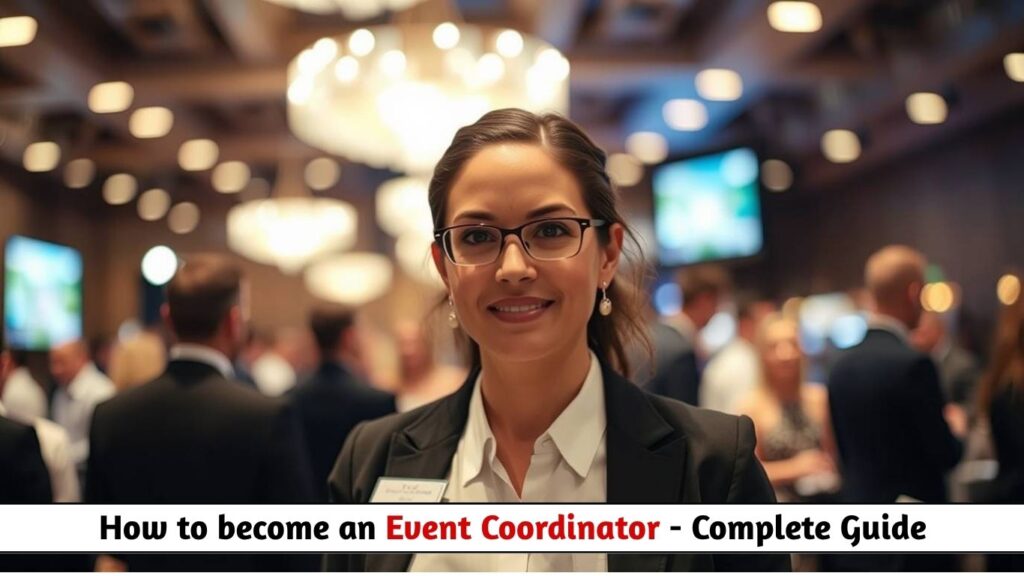
Introduction
Behind every successful event – whether it’s a dream wedding, corporate conference, or music festival – there’s a skilled Event Coordinator making it happen. This fast-paced career combines creativity, logistics, and people skills to create memorable experiences. With the global events industry projected to reach $1,552.9 billion by 2028, skilled coordinators are in high demand.
This comprehensive guide covers everything you need to launch and grow a successful career in event coordination:
- The Evolution of Event Planning
- Day-to-Day Roles & Responsibilities
- 2024 Salary Expectations Worldwide
- Essential Qualifications & Skills
- Step-by-Step Career Path
- Future Trends Shaping the Industry
History of Event Coordination
Event planning has been an essential part of human civilization for millennia:
Key Historical Milestones:
- Ancient Times: Royal courts employed “party planners” for feasts and celebrations
- Middle Ages: Guilds organized trade fairs and festivals
- 1840: First professional wedding planner (Queen Victoria’s wedding)
- 1920s: Convention bureaus emerge in major cities
- 1950s: Corporate event planning becomes professionalized
- 1990s: Digital tools transform event management
- 2020s: Hybrid events and virtual platforms revolutionize the industry
Today’s event coordinators blend traditional hospitality skills with cutting-edge technology.
Roles & Responsibilities of an Event Coordinator
Event coordinators wear many hats to ensure seamless events:
Core Responsibilities:
- Pre-Event Planning
- Consult with clients to understand vision/objectives
- Research and book venues
- Create detailed timelines and floor plans
- Vendor Management
- Source and negotiate with caterers, AV teams, decorators
- Coordinate deliveries and setup schedules
- Manage contracts and payments
- Logistics Coordination
- Arrange transportation and accommodations
- Obtain necessary permits and insurance
- Develop contingency plans
- On-Site Execution
- Oversee setup and teardown
- Troubleshoot last-minute issues
- Ensure smooth attendee experience
- Post-Event Follow-Up
- Conduct debriefs with clients
- Process final invoices
- Gather feedback for future improvements
Specialization Areas:
- Corporate Events
- Weddings & Social Events
- Nonprofit Fundraisers
- Trade Shows & Conventions
- Virtual/Hybrid Events
Event Coordinator Salary (2024)
Salaries vary by experience, location, and event type:
Global Salary Benchmarks:
| Country | Entry-Level | Mid-Career | Senior-Level |
|---|---|---|---|
| USA | $40,000 | $55,000 | $75,000+ |
| UK | £24,000 | £35,000 | £50,000+ |
| UAE | AED 120,000 | AED 180,000 | AED 250,000+ |
| India | ₹3 LPA | ₹6 LPA | ₹10 LPA+ |
Top Paying Industries:
- Luxury weddings
- Tech conferences
- Pharmaceutical events
- High-profile corporate retreats
Essential Qualifications & Skills
Educational Pathways:
- Bachelor’s Degree in:
- Event Management
- Hospitality
- Marketing
- Communications
- Certifications (Not Required But Helpful):
- CMP (Certified Meeting Professional)
- CSEP (Certified Special Events Professional)
- CPCE (Certified Professional in Catering and Events)
Must-Have Skills:
✔ Project Management
✔ Budgeting & Negotiation
✔ Multitasking Under Pressure
✔ Attention to Detail
✔ Crisis Management
✔ Tech Savviness (Event Software, Virtual Platforms)
Helpful Personal Qualities:
- Creativity
- Patience
- Diplomacy
- Enthusiasm
- Flexibility
How to Become an Event Coordinator (Step-by-Step)
Step 1: Get Relevant Education
- Pursue degree or diploma in event management
- Take courses in hospitality, marketing, PR
Step 2: Gain Hands-On Experience
- Volunteer at local events
- Intern with event companies
- Start with entry-level venue jobs
Step 3: Develop Your Network
- Join MPI (Meeting Professionals International)
- Attend industry trade shows
- Connect with vendors and venues
Step 4: Build Your Portfolio
- Document all events you work on
- Collect testimonials
- Create case studies of successful events
Step 5: Specialize
- Choose your niche (weddings, corporate, etc.)
- Get certified in your specialty
- Become known for specific types of events
Step 6: Advance Your Career
- Move to larger events/higher-profile clients
- Consider starting your own business
- Transition into event marketing or venue management
Future of Event Coordination
The industry is evolving rapidly with new technologies:
Emerging Trends:
💻 Hybrid Event Expertise
🤖 AI-Powered Event Tools
📱 Event Apps & Digital Engagement
🌱 Sustainable Event Practices
🎮 Gamification of Events
Job Outlook:
- 18% growth projected (2020-2030) – Much faster than average
- High demand for tech-savvy coordinators
- New opportunities in virtual event production
Success Stories
- Colin Cowie: Built empire planning celebrity weddings
- Mindy Weiss: Turned passion into $10M+ business
- David Adler: Pioneered modern corporate events
Conclusion
Event coordination offers a dynamic, rewarding career for organized, creative professionals. While demanding, the ability to create memorable experiences provides immense satisfaction.
Key Takeaways:
✅ Start with hands-on experience
✅ Develop both creative and logistical skills
✅ Embrace new technologies
✅ Build strong vendor relationships
The events industry is bouncing back stronger than ever – will you be part of its future?
This detailed guide provides everything needed to launch and grow in this exciting field! 🎉













Post Comment